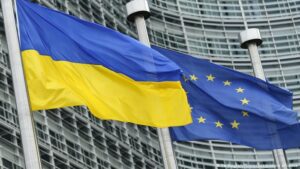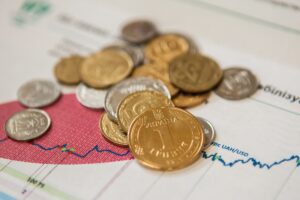
Some 54.6% of Ukrainians consider it harmful for Ukraine to receive a loan from the EU in the amount of EUR 1.2 billion under obligations to allow huge salaries for members of the supervisory boards of state-owned companies, which include many foreigners, to give foreigners an opportunity to procure medicines for Ukraine, to appoint approved people as heads of the tax, customs and judicial system, according to the results of the monitoring survey of the population of Ukraine “Dynamics of socio-political attitudes and assessments of the population of Ukraine” by the Social Monitoring Center. According to the survey presented at the Interfax-Ukraine agency on Tuesday, 19.3% of respondents consider this to be neither useful nor harmful. Some 13% called it useful, and 13.1% did not answer the question.
Some 75.5% of respondents do not support the obligations that the Ukrainian authorities undertook in the agreements with the International Monetary Fund (IMF) on the introduction of market prices for gas and heat for the population. Some 14.7% support the initiative, and 9.8% found it difficult to answer the question.
Some 82.7% indicated that they do not agree that the Ukrainian authorities, within the agreements with the IMF, undertake an obligation to reduce the number of schools and teachers. Some 9.4% agree with this and 7.9% did not answer the question.
Some 65.8% of respondents noted that they do not agree with the fact that, within the agreements with the IMF, the Ukrainian authorities undertake obligations to continue the reform of the health care system, known as the “Ulana Suprun Reform.” Some 20.4% of those surveyed agree with this and 13.8% found it difficult to answer.
Some 7.7% of respondents believe that the Ukrainian government is completely independent in its economic policy, 42.6% – “in some issues – independent, in others – it is influenced by other countries and international organizations,” 42.8% – “completely dependent on the influence of other countries and international organizations.” Some 6.9% found it difficult to answer.
Some 15.2% answered that inviting foreign citizens to work at Ukrainian authorities (Cabinet of Ministers, regional heads) and to manage Ukrainian state-owned companies (Ukrzaliznytsia, Naftogaz, etc.) was useful (15.2%). Some 28.4% indicated that neither useful nor harmful and 46.6% – harmful. Some 9.8% did not answer the question.
The survey was conducted from August 2 to August 11, 2021. Some 3,012 respondents took part in it. The method of collecting information is a personal interview at the place of residence of the respondent, the standard deviation is from 1.1% to 1.9%.

Dragon Capital has downgraded the forecast for Ukraine’s GDP growth in 2021 from 5.3% in the February forecast to 4.6%, while it expects the rate of UAH 27.5/$1 at the end of this year and UAH 28/$1 – next year, head of the company Tomas Fiala has said.
The decline in the gross domestic product of Ukraine (GDP) in January-June 2021 due to lockdown restrictions amounted to 0.6 percentage points (p.p.), Deputy Governor of the National Bank of Ukraine (NBU) Yuriy Heletiy has said.
The Ministry of Economy has estimated the growth of Ukraine’s GDP in April-June 2021 at 6%, for January-May – at 0.7%, according to the materials on the ministry’s website.
The National Bank of Ukraine improved its forecast for the current account deficit from 0.8% of GDP to 0.4% of GDP in 2021 and left unchanged the forecast for real GDP growth in 2021 at 3.8%, the regulator said on the website.
The National Bank of Ukraine in the updated Inflation Report published on the website again worsened the estimate of the growth of Ukraine’s gross domestic product (GDP) in the second quarter of 2021 (hereinafter compared to the same period in 2020), to 7.5% from 8.7% in April and from 11.3% in the January report.
The deficit of Ukraine’s foreign trade in goods in January-May 2021 increased by 25.5% compared to January-May 2020, to $ 1.078 billion from $ 859 million.
The negative balance of Ukraine’s foreign trade in goods in January-June 2021 decreased by 8.36%, to $1.25 billion with an increase in exports of almost 30.3%, to $29.97 billion, imports – by 28.4%, to $31.22 billion, according to data from the State Customs Service.
The growth of consumer prices in Ukraine at the end of June 2021 decreased to 0.2% from 1.3% at the end of May. In annual terms, inflation remained at 9.5%.
The National Bank of Ukraine (NBU) expects inflation to rise to 11% in 2021, according to a chart released by the central bank.
Revenues of the state budget of Ukraine in June 2021 amounted to UAH 106.7 billion, which is 15.9% more than the planned figure and 18.7% less than in June 2020, according to data from the State Treasury Service.
The deficit of the general fund of the state budget of Ukraine in June 2021 increased to UAH 18.5 billion, and since the beginning of the year – to UAH 49.8 billion, the Ministry of Finance has said.
The National Bank of Ukraine (NBU) on July 22 will keep the refinancing rate at 7.5% per annum, predict the majority of the bankers surveyed by the Interfax-Ukraine agency.
The total public debt of Ukraine in June 2021 grew by 1.09% in U.S. dollars and amounted to $92.52 billion, while it fell by 0.09% in hryvnias, to UAH 2.514 trillion, according to data on the website of the Ministry of Finance. Industrial production in Ukraine in June 2021 increased by 1.1% compared to June 2020, while in May the growth was 5.4%, and in April – 13%, the State Statistics Service has reported.
The volume of construction work performed in Ukraine in January-June 2021 increased by 0.2% compared to the same period in 2020.
Retail goods turnover in Ukraine in June 2021 year-over-year grew by 13% year-over-year in comparable prices, while in May the figure was 22.7%, the State Statistics Service has reported.
Publisher of “Open4Business”, PhD in Economics, Maksim Urakin

Increased demand for high-quality housing projects, rising prices for basic building materials and finishing work, an increase in the salaries of specialists led to an increase in the cost of housing construction in August by $100-120 per square meter compared to July 2021, Commercial Director of Intergal-Bud (Kyiv) Hanna Layevska said.
“We calculated that over the past month, the cost of housing construction has increased by $100-120 per square meter. And this is facilitated by the increase in prices for basic building materials and work,” she said during a discussion panel at the RED x LUN summer camp.
The increase in prices is also influenced by the intensification of demand for high-quality and modern projects, including in the form of investments in real estate. According to the director, developers are investing in the development of interesting concepts with a developed infrastructure, including additional comfort and service.
In addition, developers are more careful in choosing plots for complex development, says Intergal-Bud.
Intergal-Bud has been operating in the residential real estate market since 2003. Its portfolio includes 74 completed projects with a total area of over 3 million square meters. The company has built 158 houses (Kyiv, Kyiv region, other regions of the country).

Ukraine’s real gross domestic product (GDP) in the second quarter of 2021 grew by 5.4% compared to the second quarter of 2020, while falling by 2.2% in the first quarter of this year, the State Statistics Service published a preliminary estimate in Monday.
According to the authority, in comparison with the previous quarter (taking into account the seasonal factor), the GDP decreased 0.8%.

Ukrainian rescuers have returned to Ukraine from Turkey, where they were sent to assist in extinguishing large-scale forest fires, the press service of the State Emergency Service said.
“Two AN-32P aircraft landed at the airfield of the Special Aviation Detachment of the Operational Rescue Service of Civil Protection of the State Emergency Service of Ukraine in the town of Nizhyn,” the message says.
The head of the Service Mykola Chechotkin congratulated the Ukrainian rescuers on their return, noting that Ukraine is proud of them, and the citizens of Turkey are grateful for their invaluable help.
As reported, on July 30, planes of the State Emergency Service went to Turkey to participate in extinguishing large-scale forest fires in this country.
The fires broke out on July 28 in the tourist province of Antalya and spread to the provinces of Osmaniye, Kayseri, Kocaeli, Adana, Mersin and Mugla. The area of the fires was 1,500 hectares, four people died, about 183 people were injured, more than 100 buildings were damaged.